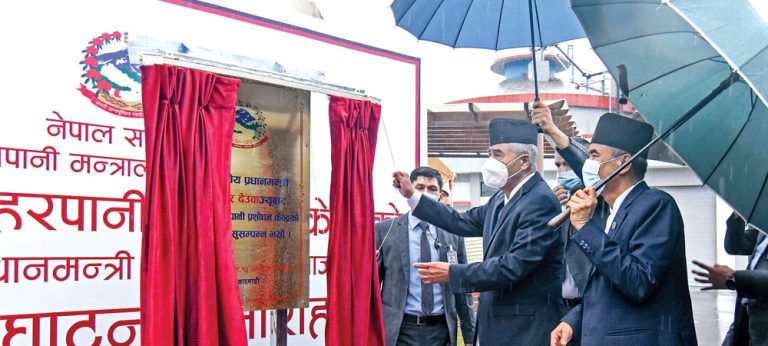
Prime Minister Sher Bahadur Deuba has said that the water treatment centre has been developed in the upper belt of the Bagmati River to ensure cleanliness in the river that flows through the Pashupati area.
Inaugurating the water treatment plant at Guheshwori area on Sunday, the PM said arrival of religious tourists will increase in the Pashupatinath area since it is a centre of faith for the Hindus all over the world.
On the occasion, PM Deuba directed the stakeholders to speed up the construction of water treatment plants at Balkumari, Dhobighat, Sallaghari, Hanumanghat, Gokarna and other sites after the completion of the treatment plant at Guheshwori area.
Likewise, Minister for Drinking Water Uma Kant Chaudhary said the government would move ahead by giving priority to the task of water treatment and the government’s sole focus so far is on providing drinking water to the citizens.
On the occasion, Minister Chaudhary said water treatment task has not progressed well in the country for lack of coordination among the implementing agencies of the government.
The Ministry stated that the entire works of the drain and sewerage management should be carried out in an integrated approach by maintaining uniformity in its standards and policy.
Also speaking at the programme, National Planning Commission Vice Chairperson Bishwa Nath Poudel pledged to forward plans for the compulsory development of water treatment plants in the new cities. The NPC is shifting its focus to this area, he added.
Lawmaker and also the former minister Bhimsen Das Pradhan asserted that Bagmati and Bishnumati Rivers bear genuine civilizations of the Kathmandu Valley. He expressed his happiness that the Bagmati Cleaning Campaign that was initiated by former Prime Minister late Girija Prasad Koirala was becoming more meaningful.
He also drew the attention of the concerned stakeholders towards the construction of waste water treatment plant in Bishnumati River too.
Kathmandu Metropolitan City Mayor Balendra Shah opined that the rivers like Bagmati were polluted due to dumping of sewage in the rivers directly. Stating that the concerned authorities should separate rainwater and sewage water, Shah shared that the KMC would launch an awareness drive for the same.
He informed that talks were held with the Minister for Water Supply on collaborating with the concerned Ministry to revive traditional spouts, hiti in the Kathmandu Valley. Secretary at the Ministry Maniram Gelal assured that low achievement in waste water treatment (at 3 per cent at present) will turn into high once the construction of the plant is completed.
Asian Development Bank’s Country Director for Nepal Arnaud Cauchois expressed his belief that the operation of the plant would help in reduction of waste in the river once the plant is operated.
He was also hopeful that it would help increase religious importance of the Pashupatinath.
Project director at Kathmandu Valley Drinking Water, Rajendra Sapkota, shared that the waste water would be filtered and gas having no smell will be released in the environment. The electricity produced from such gas would ensure 50 per cent electricity supply to run the plant, it was shared.
Source : TRN,






